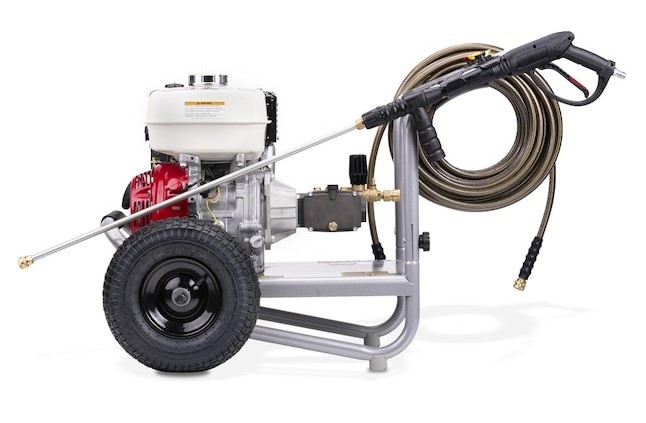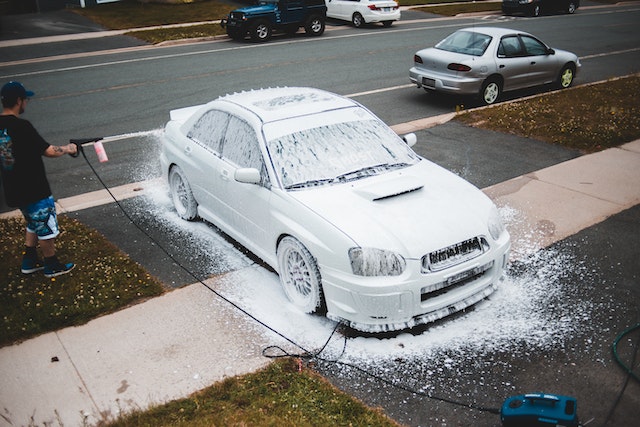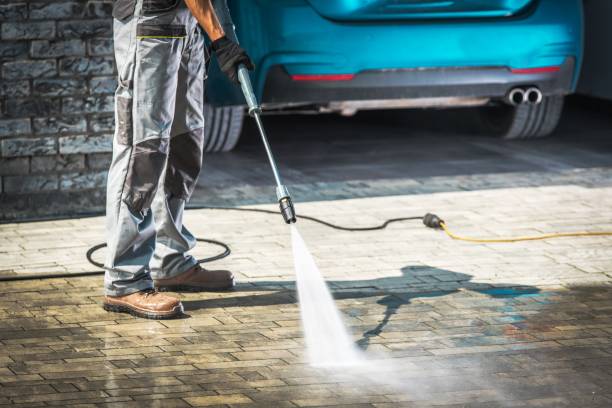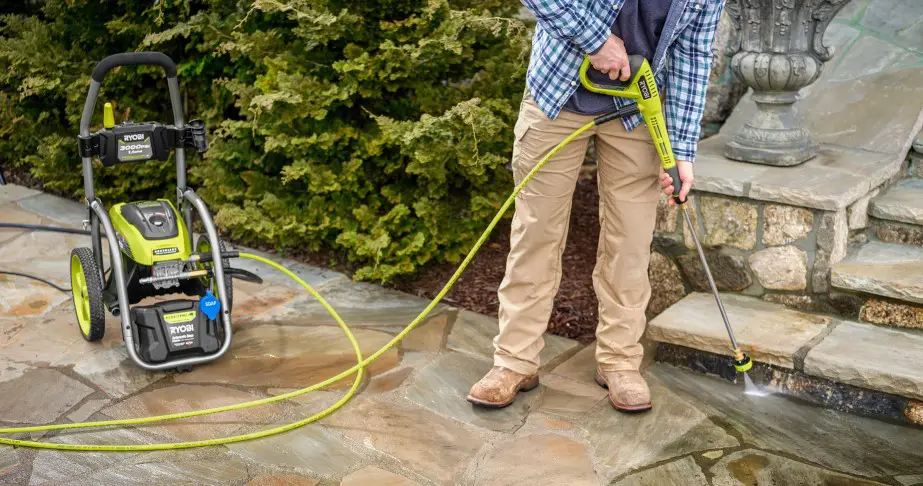Pressure washers have revolutionized the way we tackle cleaning tasks, providing a powerful and efficient solution for removing dirt, grime, and stains from various surfaces.
However, one crucial factor to consider when using a pressure washer is the pressure it generates, measured in pounds per square inch (PSI).
In this comprehensive guide, we’ll delve into the world of pressure washers, specifically analyzing why 2000 PSI is a suitable pressure for a pressure washer.
Is 2000 PSI Good for a Pressure Washer?
When it comes to determining whether 2000 PSI is good for a pressure washer, the answer is yes, it’s indeed a suitable pressure for various cleaning tasks.
While the pressure is good for most residential and light commercial cleaning needs, you must consider the specific factors that influence PSI requirements.
Factors such as surface type, cleaning task, and safety considerations should be taken into account to ensure optimal cleaning outcomes and prevent any potential damage.
Related: Revealed! Best Time to Buy a Pressure Washer
3 Reasons Why 2000 PSI is Good for a Pressure Washer
The following are the main reasons.

1. Versatility
A pressure washer with a 2000 PSI rating offers versatility, making it suitable for a wide range of residential and light commercial cleaning needs.
From cleaning driveways and patios to revitalizing decks and fences, a 2000 PSI pressure washer provides sufficient power to tackle common cleaning tasks effectively.
2. Effective cleaning
With 2000 PSI, the pressure generated is strong enough to remove dirt, grime, and stains from surfaces efficiently.
It can make a noticeable difference in restoring the appearance of various outdoor areas and objects, such as siding, vehicles, outdoor furniture, and more.
3. Efficiency
A 2000 PSI pressure washer strikes a balance between cleaning power and water consumption.
It offers enough pressure to achieve effective results while minimizing excessive water usage.
This efficiency not only saves time but also conserves water resources.
Limitations of a 2000 PSI Pressure Washer & their Solutions
Challenging stains
While a 2000 PSI pressure washer is effective for most common cleaning tasks, it may struggle with deeply embedded or stubborn stains.
Stains that have penetrated porous surfaces or have been present for a long time can be difficult to remove solely with the pressure provided by a 2000 PSI washer.
In such cases, additional techniques or specialized cleaning agents may be necessary to achieve the desired results.
Solutions
- Pre-Treatment
Pre-treating the stained area with a suitable cleaning agent can help break down and loosen the stain before using the pressure washer. This allows the water pressure to work more effectively in removing the stain.
- Scrubbing or brushing
For stubborn stains, manually scrubbing or brushing the area in conjunction with the pressure washer can enhance the cleaning process. The mechanical action helps agitate the stain, making it easier to remove.
- Chemical cleaners
Certain stains, such as oil or grease, may require the use of specialized cleaning agents or solvents designed to dissolve or break down the specific stain. These cleaners can be applied before or during the pressure washing process to improve stain removal.

Heavy-duty cleaning
For heavy-duty industrial or commercial cleaning tasks that require intense pressure, a 2000 PSI pressure washer may not be sufficient.
These situations usually involve large-scale or heavily soiled surfaces that require more power to remove dirt, grime, or coatings.
Solutions
- Higher PSI Options
In cases where heavy-duty cleaning is required, pressure washers with higher PSI ratings are more suitable.
Professional-grade pressure washers, often exceeding 3000 PSI, are designed to handle tough cleaning challenges encountered in industrial settings or for professional contractors.
- Hot Water Pressure Washers
In addition to higher pressure, hot water pressure washers can provide enhanced cleaning performance.
These methods utilize abrasive materials, such as sand or glass beads, to mechanically remove tough stains or coatings.
The combination of high-pressure and heated water helps to break down and remove stubborn grease, oil, and other tough contaminants more effectively.
- Abrasive Cleaning Methods
In extreme cases, where conventional pressure washing is insufficient, abrasive cleaning methods such as sandblasting or abrasive blasting may be required.
Related: How a Pressure Washer Unloader Valve Works
PSI Ranges and their Applications
To better understand the suitability of 2000 PSI pressure washers, let’s explore different PSI ranges and their respective applications.
Low-Pressure Range (1000-2000 PSI)
This range is often used for delicate surfaces and lighter cleaning tasks.
It offers a gentle yet effective cleaning solution, ensuring that surfaces are cleaned without causing damage.
Applications
- Washing Vehicles
Low-pressure washers are perfect for cleaning cars, motorcycles, boats, and other vehicles.
The lower pressure reduces the risk of stripping paint or damaging delicate parts, while still providing enough force to remove dirt, mud, and grime.
- Cleaning Windows
A low-pressure washer is ideal for cleaning windows and glass surfaces.
It ensures that the glass is cleaned thoroughly without the risk of cracking or shattering due to excessive force.
- Outdoor Furniture
Delicate outdoor furniture, such as wicker or fabric-covered pieces, can be safely cleaned with a low-pressure washer.
The lower pressure helps prevent damage while effectively removing dust, pollen, and other debris.
Medium-Pressure Range (2000-3000 PSI)

Within the medium-pressure range, the 2000-3000 PSI mark offers versatility and effectiveness for a wide range of cleaning tasks.
This range provides more power and is suitable for tougher cleaning jobs.
Applications
- Driveways and Sidewalks
A medium-pressure washer is ideal for cleaning concrete surfaces.
It effectively removes dirt, oil stains, mildew, and moss, revitalizing driveways and sidewalks.
- Decks and Fences
Wooden decks and fences often require a bit more pressure to remove grime, algae, and other stubborn stains. A 2000-3000 PSI range pressure washer can efficiently clean these surfaces without causing damage.
- Brick and Masonry
Medium-pressure washers are also suitable for cleaning brick and masonry surfaces. They can remove dirt, efflorescence, and moss, restoring the appearance of exterior walls and retaining walls.
High-Pressure Range (3000+ PSI)
The high-pressure range, starting from 3000 PSI and above, is reserved for heavy-duty cleaning tasks.
While this range offers more power, caution must be exercised as it can cause damage to sensitive surfaces.
Proper technique, appropriate nozzle selection, and understanding of the surface’s tolerance to pressure are vital when working with high-pressure washers.
Applications
- Commercial and Industrial Cleaning
High-pressure washers are commonly used for commercial and industrial cleaning tasks. They can efficiently clean large areas, remove stubborn stains, and strip paint from surfaces.
- Graffiti Removal
Removing graffiti often requires high-pressure washers to successfully eliminate paint or marker ink from walls and surfaces.
- Heavy Machinery and Equipment
High-pressure washers are suitable for cleaning heavy machinery, construction equipment, and vehicles with tough grime and grease buildup.
Related: 10 Best Places to Buy Pressure Washers
Factors to Consider when Choosing the Right PSI
Several factors play a role in determining the appropriate PSI for different cleaning tasks.
These include the following.
Surface type
Different surfaces have varying levels of sensitivity to pressure.
For example, concrete can withstand higher PSI, while wood or delicate materials may require lower pressure.
Cleaning task
The intensity and type of cleaning task also affect the necessary pressure level.
Whether you’re removing dirt, stains, paint, or tackling heavy-duty grime, understanding the impact of grime level on the required pressure will help you achieve optimal cleaning results.
Safety considerations
Using the correct pressure not only ensures effective cleaning but also prevents damage to surfaces and minimizes the risk of injury.
Related
- Best Time to Buy a Pressure Washer (Revealed)
- Ryobi Vs Craftsman Pressure Washers
- Best Pressure Washers Under $600
- How Does a Pressure Washer Unloader Valve Work? (Answered)
- Ryobi Vs Generac Pressure Washer (In-depth Reviews)
- Pressure Washing Pros and Cons
- Karcher Vs Ryobi Pressure Washers (Comparison)
- 10 Best Places to Buy Pressure Washers
- Ryobi Vs Simpson Pressure Washers (Final Verdict)
- How to the Change Oil in Your Pressure Washer Pump
- Simpson Vs Craftsman Pressure Washers (Detailed Review)
- Karcher Vs Greenworks Pressure Washer Review
- How to Unclog a Pressure Washer (Complete Guide)


